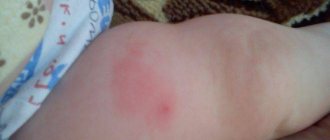Can a child have a runny nose after DPT vaccination?
Any vaccination significantly weakens the immune system due to the introduction of foreign substances into it. DTP is a complex drug. It contains 3 antigens at once: pertussis microbes, tetanus and diphtheria components. All the diseases that this vaccine is designed to protect against are deadly.
DPT vaccine
Therefore, DTP vaccination is carried out for babies from 3 months. And this is a big burden on the infant’s fragile immune system, which spends energy recognizing and eliminating dangerous pathogenic microorganisms that it has not encountered before.
A runny nose in the post-vaccination period is a common occurrence, and you should not be afraid of it: this is the body’s peculiar reaction to the introduced pathogens . There is no serious danger here.

Typically, infectious rhinitis appears in the first 1-3 days after immunization. This is fine. As a rule, after the procedure, the doctor prescribes additional consultations for the baby to monitor the child’s condition.
If a runny nose bothers your baby, you should tell your pediatrician about it. He will prescribe the necessary therapy. So, if rhinitis appears in the first few days after immunization, then there is no reason to worry.
But sometimes it can last for more than a month, which is likely to cause concern. A common reason is a prolonged reaction of the body to the drug and fragile immunity.
To avoid possible negative effects from the vaccine, parents should familiarize themselves with the composition of the drug with which the baby will be vaccinated and study the contraindications. If you have any concerns or questions, you should discuss everything with your therapist.
Parents should know that even a minor illness of an infectious nature in a child on the day of vaccination (this includes a runny nose) is the reason for refusing vaccination and postponing the procedure until the child has fully recovered.
Can I have a runny nose after DPT vaccination?
Vaccination is carried out to prevent the occurrence of various infectious diseases. Each vaccination has its own contraindications and can lead to side effects.
The most common phenomena are:
- Personal intolerance to the components of the drug.
- Increased body temperature.
- Cough, runny nose.
Vaccinations must be approached responsibly. Before vaccination, the specialist informs parents about possible side effects.
Before vaccination, it is recommended to undergo tests and also see a doctor. The therapist examines the patient: listens to the lungs, assesses the condition of the throat, and also identifies possible manifestations of an acute respiratory infection.
Important! Before vaccination, you must make sure that the child is completely healthy. If you have a runny nose, cough, or red throat, vaccination must be postponed until complete recovery.
DPT can cause allergic rhinitis.
The allergic effect of vaccination on the body can be reduced by taking antihistamines.
In some cases, there is an increase in body temperature.
At home you need to have a means to lower the temperature: these can be suppositories with paracetamol, Nurofen forte syrup, Eferalgan suppositories.
If snot appears after DTP, this is a signal that the body’s defenses are aimed at fighting bacteria. After vaccination, the child develops antibodies to resist this type of infection.
If a runny nose after DTP vaccination began a few days after the administration of the drug, then there is no need to worry. It is recommended to consult a specialist. Among all vaccinations, it is DTP that puts a strong burden on the body. It contains components of three diseases such as whooping cough, diphtheria, and tetanus.
Experts are inclined to believe that it is the whooping cough component that causes side effects. Today, experts have developed a complex drug that does not contain the whooping cough component. The vaccine is called ADSM and causes minimal negative consequences.
There are also imported analogues of this vaccine called Infanrix-Dexa, Polydexa.
How long will a child have snot after vaccination?
In most cases, snot after DPT is not a protracted phenomenon. They usually go away in a day or two. If rhinitis continues for the second week, then a doctor’s consultation is required.
Having found out the cause of the ailment, the pediatrician will prescribe the necessary therapy. You can’t procrastinate with a runny nose; it only looks harmless.
If the situation is neglected, the infection will spread throughout the body. A cough will appear, and the baby will begin to have ear pain. You need to understand that in this situation the vaccine is not to blame.
A disease that is not cured in time (against the background of weakened immunity by vaccination) often contributes to the addition of other pathologies. Therefore, it is so important to monitor the baby’s well-being in the first post-injection days.
What to do if a baby has a runny nose after DTP vaccination?

Despite the fact that a runny nose is a minor and harmless syndrome, it can be very annoying for a small patient, interfering with normal life and creating discomfort.
In this case, the doctor usually prescribes a number of medications to combat this problem. It is not recommended to delay too much with rhinitis, as it can develop into more unpleasant diseases of the nasopharynx.
At the initial stage, the doctor determines the “culprit” – the infectious pathogen. Then the baby will be prescribed a course of antibacterial medications.
No temperature
The first step is usually to use drugs that restore normal nasal breathing and eliminate swelling of the nasal passages. Vasoconstrictors, available in many forms (sprays, tablets or drops), are perfect here. Sprays are a good choice, as they cover the entire inside of the nose.
The following drugs have proven themselves to be effective:

- Sanorin and Nazol;
- Naphthyzin and Galazolin;
- Pinosol.
However, many doctors do not recommend using vasoconstrictors for more than one week. After all, each drug has its own side effects.
Medicines have contraindications that should be taken into account:
- arrhythmia;
- cardiac ischemia;
- angina pectoris.
If the patient has these pathologies, then you should additionally consult a doctor about further therapy. We must not forget about products that moisturize the nasal mucous membranes, since the above medications often have a drying effect. Sanorin Aqua or No-Sol will moisturize the mucous membrane well.
Inhalations also have a good effect. This can be a decoction of herbs or potatoes.
With an increase in body temperature
If a runny nose is accompanied by an elevated temperature, this indicates the onset of an acute respiratory viral infection.
In this case, a standard set of medicines prescribed by a doctor to fight colds will help. Separately, it is worth highlighting funds aimed at eliminating the causative agent of the disease. These include drugs that have anti-inflammatory properties.
The release form can be any: tablets, powders, drops or solutions. Anti-inflammatory drugs are usually used in the early stages of treatment.
It is during this period that they give the best effect. The most popular: Coldrex, Rinza and Theraflu . These drugs have a mild effect, absolutely harmless to the health of the baby.
DTP vaccination can cause an allergic runny nose in an infant. In this case, antihistamines are required. If rhinitis is accompanied by fever, you can give your baby Nurofen Forte syrup or use rectal suppositories, for example, Efferalgan.
What to do if you have a runny nose after vaccination
What to do if you have a runny nose after DTP?
This is a pressing question among most mothers. This reaction is a minor symptom, but at the same time, rhinitis is very annoying and interferes with normal life.
After vaccination, parents should monitor the child's health.
A runny nose can appear within a few days or after a month. This problem is common among most patients.
If a runny nose began in the first days after vaccination and went away within a few days, then treatment is not required. With a long-term runny nose, which lasts two weeks or more, it is necessary to diagnose the body to identify the cause.
The doctor will prescribe complex therapy to combat the runny nose. Prolonged rhinitis can have a negative impact on other organs, and manifest itself in the form of cough, ear pain, and so on.
The pharmacological market is overflowing with drugs for the treatment of rhinitis.
Initially, it is necessary to use drugs that help restore normal nasal breathing, reducing swelling.
Common remedies include: Nazol, Sanorin or saline solution according to the Komarovsky method.
The next stage of treatment involves getting rid of the infection that caused rhinitis.
Anti-inflammatory drugs that are used at the initial stage of the disease have a positive effect. Having a mild effect on the body, they practically do not harm the body. Vitamin C helps strengthen the immune system. The next step is moisturizing the mucous membrane .
Mucus with pathogenic flora may accumulate in the nasal passages, which must be removed. You can use Nosol, Sanorin aqua, Aquamaris.
These preparations are based on salt water , which perfectly moisturize and disinfect the mucous membrane. Rinsing the nose with saline has a positive effect. Rinse water can be prepared at home from table salt or sea salt.
Has a positive effect on the functioning of the respiratory inhalation system. They can be carried out using boiled potatoes, a decoction of medicinal herbs. All these procedures can be carried out at the initial stage, when it is difficult to say what caused the runny nose. The snot started after the DPT vaccination, or an infection developed.
Video on the topic
About the runny nose and other reactions to vaccination in the video:
Before getting any vaccinations, you need to make sure in advance that the child is healthy, pass all the necessary tests and undergo consultations with specialists. But even this does not always prevent the development of adverse reactions.
A runny nose, as already mentioned, is evidence of the beginning of the body’s process of fighting the vaccination bacteria. Therefore, you should not worry too much if rhinitis appears at the beginning of the post-vaccination period. It is not the worst among all the side syndromes, and it is quite easy to overcome.











